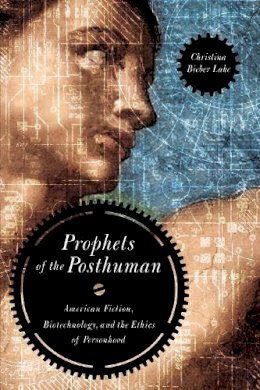Christina Bieber Lake is the Clyde S. Kilby professor of English at Wheaton College. She is the author of The Incarnational Art of Flannery O'Connor.
“Christina Bieber Lake’s Prophets of the Posthuman is an insightful and well-written monograph that brings the work of nine American fiction writers to bear on ethical questions concerning biotechnology. . . Lake’s text is brimming with insightful readings of fiction in dialogue with thoughtful ethical reflections.” —Modern Theology “Bieber Lake’s treatment of each prophetic work of fiction shows an expansive awareness of the greater bioethical conversation, with a deft perception of the many implications involving the posthuman condition.” —Journal of Interdisciplinary Studies “On the whole, Lake’s argument is key in helping fiction writers, literary scholars, and others engaged in the humanities and arts to make the case for the relevance of fictional narrative to philosophical speculation and scientific pursuit.” —Flannery O’Connor Review “The book skillfully interweaves the futuristic predictions of biotechnology advocates, such as Steven Pinker, Daniel Dennett, Lee Silver, Simon Young, Ray Kurzweil, and Rodney Brooks, with selected narratives from nine of our most perceptive fiction writers. . . . All librarians will find its extensive bibliography a helpful guide to insightful books on bioethics and to some great, ethically engaging fiction.” —Catholic Library World “Tightly structured the study offers close readings of novels and short stories that illuminate hitherto ignored dynamics of these narratives. Bieber Lake demonstrates their potential to challenge the dominant culture of consumerism, scientific positivism, and the bioenhancement technologies. A rich bibliography ranging from Saint Thomas Aquinas to Ray Kurzweil accompanies the book.” —American Studies “Lake’s method throughout the eight chapters of the book is to set up a contemporary champion of enhanced, winnowed, genetically perfected future humans and then to show how a particular fiction writer questions and undermines such idealized (and perverse!) visions. . . . Lake always seems to find something in the literary insights that resounds with the reader. . . .” —Journal of Markets and Morality “In this refreshing take on the hoary debate between science and faith, Lake investigates the ethical dimensions of the biotechnology revolution based on the biblical assumption that the most basic human good is neighborly love. . . . Writing in engaging prose, Lake works to make literary criticism relevant for contemporary life. . . .” —Choice "Prophets of the Posthuman develops a self-professed Christian response to the belief that human problems can be solved through biotechnologies such as plastic surgery, genetic engineering, and psychiatric drugs. Reading authors from George Saunders to Walker Percy, Toni Morrison to Flannery O'Connor, the monograph argues that the culture of biotechnology contributes to a pernicious view of the human as lacking unique personhood and always requiring improvement. . . . This readable book will interest scholars of bioethics and Christianity." —American Literature "Lake produces an arresting social commentary on the ascendancy of transhumanism and posthumanism—technoprogressives. Blending fictional works with technoprogressive aspirations, Lake contrasts different notions of the 'good life.' . . . This book will reward anyone interested in a Christian approach to the challenge of technological enhancement." —Religious Studies Review “Prophets of the Posthuman provides a fresh and original reading of fictional narratives that raise the question of what it means to be human in the face of rapidly developing bioenhancement technologies. . . . [It] insists that because technology can never ask whether we should do something that we have the power to do, literature must step into that role.” —The Midwest Book Review

